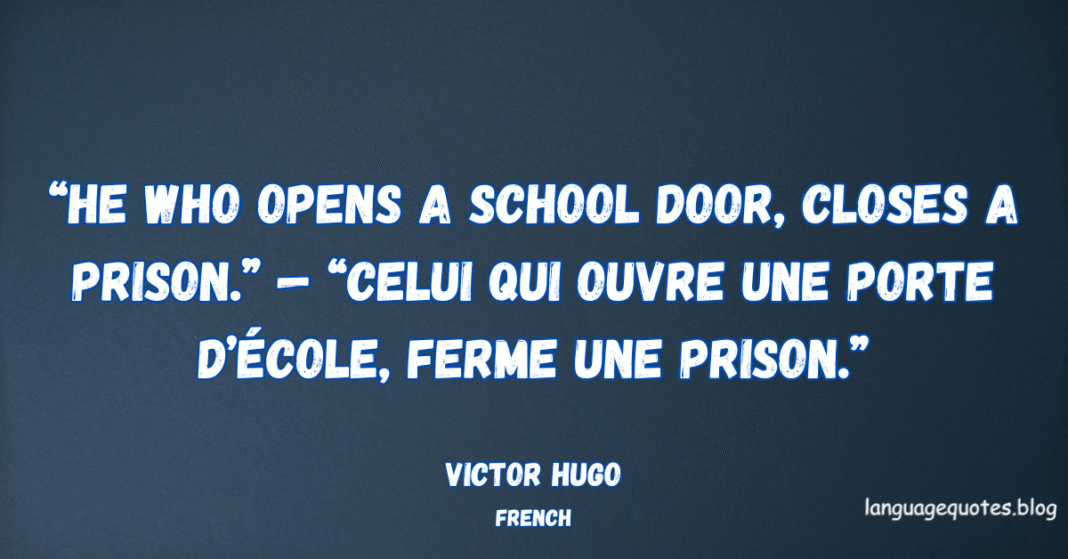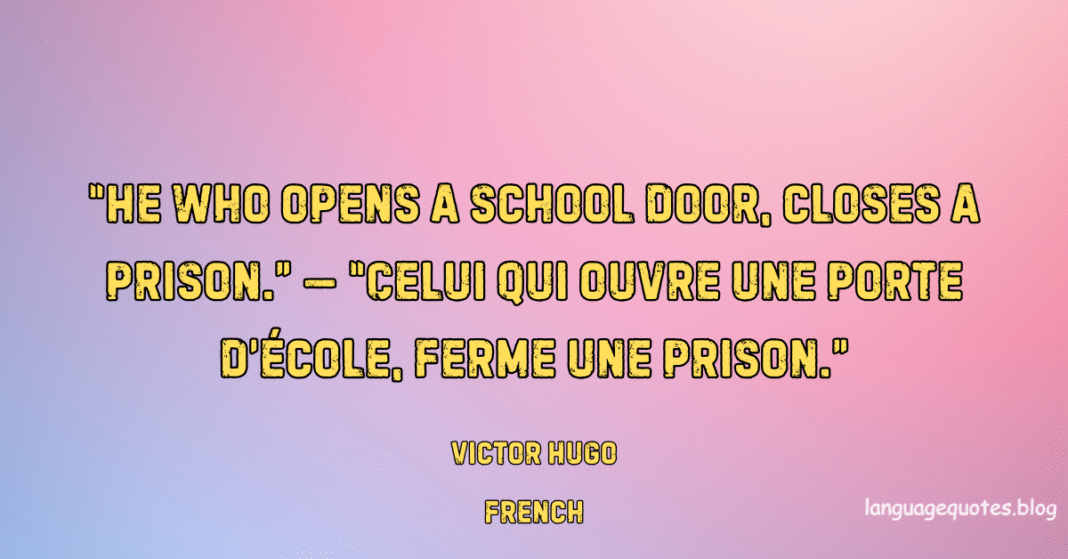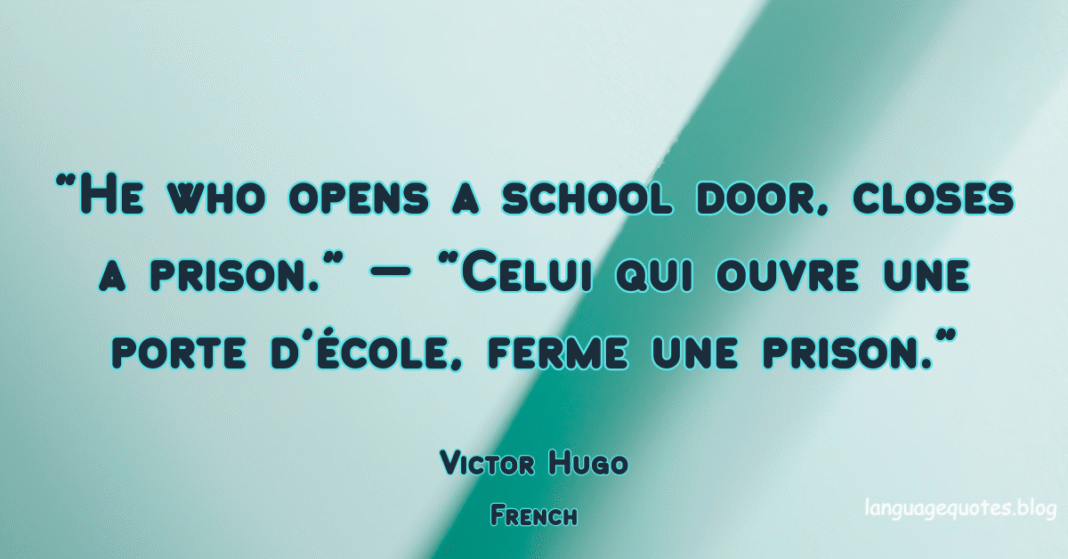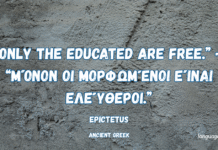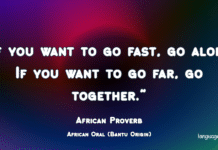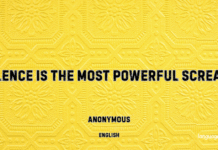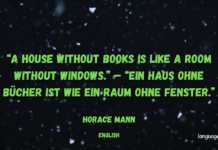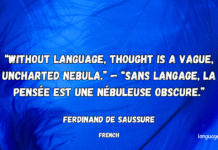“He who opens a school door, closes a prison.”
— Victor Hugo
🗨️ 2- Line Commentary:
This quote reminds us that education is not just a personal tool, but a social shield. Every open school door is a barrier against the darkness of despair, crime, and generational decline.
📚 Introduction: The Wisdom Behind a Door
Victor Hugo, one of the most powerful literary and philosophical voices of 19th-century France, left behind a legacy of words that transcended fiction. His quote, “He who opens a school door, closes a prison,” serves as both a poetic expression and a profound societal observation. Though written in a time long past, it rings truer than ever today, in a world still grappling with inequality, crime, poverty, and access to education.
At first glance, this quote may seem simple, but it is deeply layered. In just a single line, Hugo challenges systems of governance, social responsibility, and humanity’s collective moral compass. He implies that education is more than a tool—it is a shield, a reformer, and a liberator.
🏫 Education as a Preventive Measure
Let’s begin by unpacking the obvious meaning: opening schools reduces the need for prisons. When people are given knowledge, skills, and the capacity to think critically, they are less likely to commit crimes born of ignorance, desperation, or lack of opportunity. Hugo does not suggest that all who end up in prison are uneducated, but he draws a strong correlation between the absence of education and the presence of systemic failure.
In societies where education is prioritized, the rates of crime and incarceration tend to be lower. Countries that invest heavily in public education often see a more educated, employable, and civically responsible population. The more doors we open to schools, the fewer we need to open to cells.
🔍 The Cycle of Ignorance and Incarceration
One of the gravest social cycles in the world today is the school-to-prison pipeline. This refers to the societal trend where underfunded schools, racial or class biases, and punitive education systems push vulnerable children—especially from marginalized backgrounds—toward disciplinary action and eventually into the criminal justice system.
Victor Hugo’s quote seems to anticipate this tragic pattern. By opening the doors of opportunity early in life, we stop the cycle before it begins. Schools become safe havens—places where young people find guidance, purpose, and mentorship rather than punishment and neglect.
🌍 A Global Perspective
This quote is as applicable in developing countries as it is in developed ones. In regions where education is still not universally accessible, children face the risk of being exploited, abused, or drawn into illegal activities. Here, every school built, every teacher trained, and every child educated is a direct blow against the forces of crime, violence, and despair.
Meanwhile, in industrialized nations, debates rage about education budgets vs. incarceration budgets. In many countries, governments spend more per inmate than they do per student. Hugo’s quote calls this imbalance into question and argues for a shift in moral and financial priorities. Shouldn’t we spend more on nurturing young minds than managing broken ones?
🧠 The Deeper Psychological Message
Victor Hugo was not just a novelist—he was a thinker. His quote can also be interpreted symbolically. The “school door” represents enlightenment, growth, and opportunity. The “prison” stands for ignorance, stagnation, and control. On a personal level, when an individual opens themselves to learning, they free themselves from the mental prisons of prejudice, fear, and limitation.
So, this quote is not just about formal education. It also promotes lifelong learning, self-awareness, and intellectual curiosity. Hugo encourages us to read, explore, ask questions, and seek wisdom—to keep opening doors, no matter our age or status.
🖋️ About the Author: Victor Hugo’s Vision
Victor Hugo (1802–1885) was more than just the author of Les Misérables and The Hunchback of Notre-Dame. He was an advocate for human rights, education reform, and the abolition of the death penalty. In fact, he often used literature to highlight the plight of the poor and the corrupt systems that kept them oppressed.
His quote comes from the same spirit that inspired Jean Valjean, the reformed convict who is pursued relentlessly by the law despite striving to live a good life. Hugo’s literature and his quotes call upon society to not just punish, but understand and prevent. And prevention, in Hugo’s eyes, begins in the classroom.
💡 Relevance in the Modern Digital Era
In the age of the internet, opening a “school door” could also mean giving a child access to Wi-Fi, a laptop, or a safe space to study. Modern education is no longer just about books and chalkboards. It’s about inclusion, accessibility, and equity in a tech-driven world.
At the same time, the “prison” today can be metaphorical. It could be the trap of misinformation, digital addiction, social isolation, or a closed mindset. Education—when done right—frees us from all of this. It allows us to discern truth, value diversity, and solve real-world problems.
🎯 Final Takeaway: Educate to Liberate
The beauty of Hugo’s quote lies in its timelessness and its simplicity. It speaks to the soul of a society and urges it to invest in transformation over punishment, and in hope over fear. Every school door opened is a declaration that we believe in change, in potential, and in the future.
Let’s remember: books build futures, classrooms create leaders, and teachers shape generations. A single open school door can change the course of a life—and that life may one day go on to open many more.


